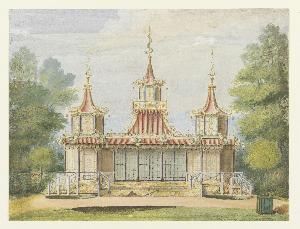Frederick Crace
Frederick Crace;Crace
Place: London
Born: 1779
Death: 1859
Biography:
Frederick Crace was a prominent English interior decorator, born on June 3, 1779, and passed away on September 18, 1859. He is best known for his work with George IV, the Prince of Wales, for whom he created the exquisite chinoiserie interiors of the Brighton Pavilion. Crace's work was not limited to interior decoration; he was also a collector of maps, topographical prints, and drawings, which are now housed at the British Library.
Early Life and Career
Frederick Crace was the son of John C. Crace, a well-known London decorator. His father had been hired in 1788 to provide Chinese works of art for the Royal Pavilion, which sparked Frederick's interest in interior decoration. Crace's work with his father and later on his own led him to become a skilled interior decorator, particularly in the chinoiserie style.
Notable Works
Some of Crace's notable works include the interiors of Windsor Castle and Buckingham Palace, where he was assisted by his son, John Gregory Crace. He also designed the St James's Theatre in London, which showcased his skills as a theatre designer. Key aspects of Crace's work:
- Chinoiserie style interiors
- Use of topographical prints and drawings
- Collaboration with his son, John Gregory Crace
Legacy
Frederick Crace's legacy extends beyond his interior decoration work. He was also a collector of topographical prints and drawings, which are now an important part of the British Library's collection. His son, John Gregory Crace, continued his father's business, and their company, Frederick Crace & Son, became a well-known name in the interior decoration industry. For more information on Frederick Crace and his work, visit Frederick Crace on Wikioo.org. You can also explore the British Library's collection of topographical prints and drawings, which includes many pieces collected by Crace.
Related Artists and Museums
Other notable artists and museums related to Frederick Crace include:
Frederick Crace's work and legacy can be explored further through these related artists and museums. His contributions to the world of interior decoration and his collection of topographical prints and drawings continue to inspire art enthusiasts today.

